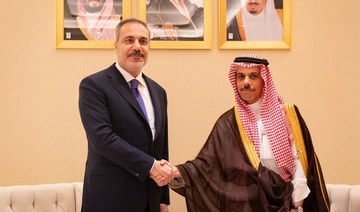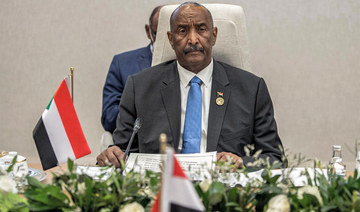KABUL: After years of abandonment, the ruined Darul Aman palace in Kabul, one of the most recognizable symbols of Afghanistan’s decades of war, is to be restored in a project authorities hope will come to symbolize revival instead of destruction.
The aim is an ambitious one, with Afghan forces fighting the Taliban insurgency across the country, Kabul regularly hit by suicide attacks and the broken economy seemingly in no better shape than the bombed-out palace itself.
The project was launched by President Ashraf Ghani in May and Urban Development Minister Sadat Mansoor Naderi said the government hoped the site, next to a new, Indian-financed Parliament, can become the center of a new government quarter as well as a tourist attraction.
For the moment, such goals remain a long way off and the most visible sign of renewal is a crew working on preparing the site for the full reconstruction to come later.
“In the team we’ve built here, we’ve got over 100 young graduates,” Naderi told Reuters during a visit to the site this week.
“Twenty percent of the technical engineers you see here are female,” he said.
In a country where opportunities for women to develop careers are severely limited, the restoration effort, which will depend heavily on support from foreign donors, is a showcase for young graduates.
“This is a historical site and of course it’s a new experience,” said Sofia Roshan, 24, a structural design engineer who graduated recently from a private university in Kabul and has been working at the site for four months.
She said the fact the restoration was so unusual meant there was more freedom for younger engineers and women in particular than there would be in a standard construction project.
“It’s different from a new building so it’s a new experience for everyone. We can learn from the project but we can also share our opinions,” she said.
“People don’t put much value on women in Afghanistan but this project will show that women can do anything.”
Reduced to a shattered skeleton following repeated bombardments over the years, the imposing European-style palace was built in the 1920s by former King Amanullah Khan on a low hilltop just outside the capital.
The edifice was destroyed in the civil wars of the 1990s, when fighting between rival militias killed thousands in Kabul. In the years after the fall of the Taliban, the bullet-scarred wreckage was left empty as a flood of foreign cash fueled a boom in the city around it.
Its abandoned corridors, rooftops open to the sky and the faded graffiti left by passing militia fighters have a ghostly feel as dusty sunlight streams in through cracks in the walls.
“This is the result of war. Think about that,” reads a message scrawled on a corner wall.
Naderi said requests for proposals would soon be issued, inviting foreign companies to bid for work on the project, which could cost up to $20 million, and officials had already sought advice abroad.
The celebrated restoration of the Reichstag in the German capital Berlin, which like the Darul Aman palace was destroyed in war and abandoned for decades and which incorporates many reminders of the destruction, was one model he had looked at.
“Obviously, we are looking at other countries with similar experiences to ours,” he said.
How long the project may take is not clear. Until engineers complete surveys, they will not know the full extent of the damage and how much work will be needed to repair it. Financing must also be worked out and Afghanistan’s unpredictable politics may still create obstacles.
But for Sonia Alizada, one of the young engineers working on the palace, her enthusiasm outweighs any doubts.
“We are a team of girls working here with joy and everyone has a huge interest,” she said. “We hope for peace, stability and development in our country.”
Hopes for revival pinned on Afghan palace restoration
Hopes for revival pinned on Afghan palace restoration
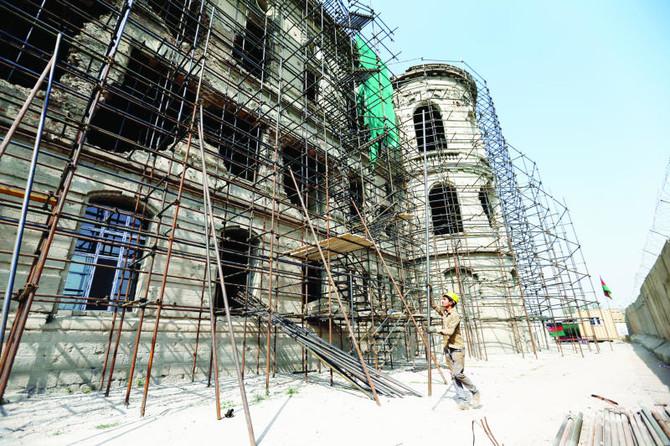
US President holds separate calls with leaders from Qatar, Egypt over Gaza ceasefire talks

- The danger of a military escalation in Rafah was also stressed, in how it would add catastrophe to an already worsening humanitarian crisis that would impact stability and security in the region, the statement said
CAIRO: Egyptian President Abdel Fattah El-Sisi received a phone call on Monday from US President Joe Biden to discuss the latest developments in negotiations over a ceasefire in Gaza and the dangers of a military escalation in Rafah, a statement from Egypt’s presidency said.
The spokesman for the Egyptian Presidency said the call also touched on the exchange of Israeli hostages for Palestinian prisoners, a main sticking point in any comprehensive ceasefire deal between Hamas and Israel.
A Hamas delegation is currently in Cairo to deliberate on Israel’s response to a ceasefire deal.
The danger of a military escalation in Rafah was also stressed, in how it would add catastrophe to an already worsening humanitarian crisis that would impact stability and security in the region, the statement said.
“President El-Sisi stressed the necessity of full and adequate access to humanitarian aid, reviewing the intensive Egyptian efforts in this regard.
The two presidents also stressed the necessity of working to prevent the expansion of the conflict and reaffirmed the importance of the two-state solution as the means to achieve security, peace, and stability in the region,” the Egyptian presidency statement said.
Biden also held a phone call late on Monday with Qatar’s Emir Sheikh Tamim bin Hamad Al Thani, whose country has also played a role as mediator to the conflict.
“During the call, they discussed developments in the situation in the Gaza Strip and the occupied Palestinian territories, and efforts of the two countries to reach an immediate and permanent ceasefire agreement in Gaza,” Qatar’s Emiri Diwan said in a statement.
India protests separatist slogans allowed at Toronto event
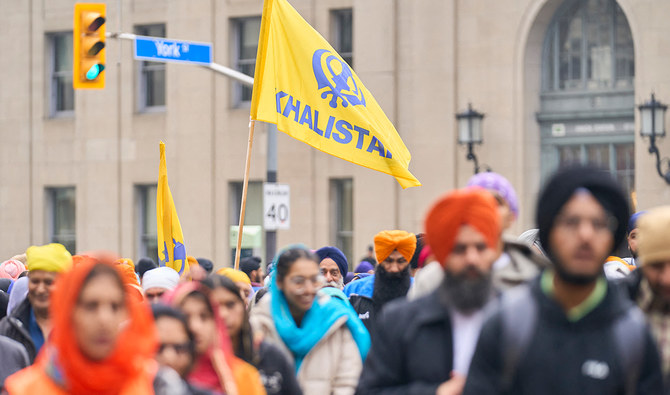
- Bilateral relations soured last year after Canada linked Indian agents to June 2023 murder of its national
- Hardeep Singh Nijjar, 45, was shot dead outside a Sikh temple in Surrey, which has a large Sikh population
NEW DELHI: India summoned the Canadian Deputy High Commissioner on Monday and expressed “deep concern and strong protest” after separatist slogans in support of a Sikh homeland were raised at an event addressed by Prime Minister Justin Trudeau.
Bilateral diplomatic relations soured last year after Trudeau said Canada was “actively pursuing credible allegations” that Indian agents were potentially linked to the June 2023 murder of a Canadian citizen.
Hardeep Singh Nijjar, 45, was shot dead outside a Sikh temple on June 18 in Surrey, a Vancouver suburb with a large Sikh population. Nijjar supported a Sikh homeland in the form of an independent Khalistani state and was designated by India as a “terrorist” in July 2020.
New Delhi has denied any formal government role in Nijjar’s murder.
India’s foreign affairs ministry said on Monday it had conveyed “deep concern and strong protest” at such actions “being allowed to continue unchecked at the event.”
Slogans supporting the rise of a separatist state were raised at an event in Toronto, according to ANI news agency, in which Reuters has a minority stake.
“We will always be there to protect your rights and your freedoms, and we will always defend your community against hatred and discrimination,” ANI reported Trudeau as saying.
Canada has the highest population of Sikhs outside their home state of Punjab in India, and the country has been the scene of many demonstrations that have irked India.
The Canadian foreign ministry did not immediately respond to a request for comment.
UN asks South Sudan to remove new taxes that led to a pause in food airdrops
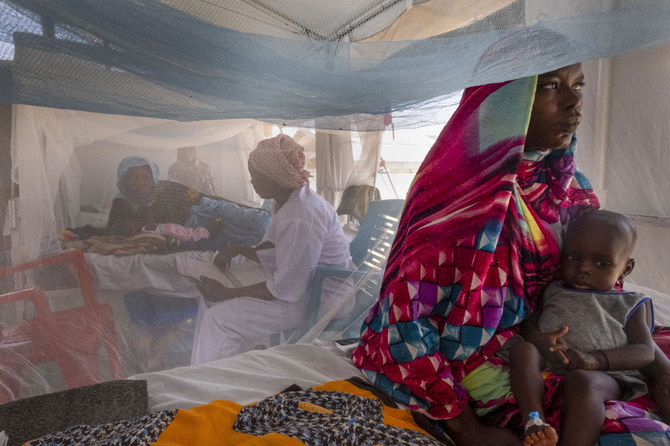
- UN said that pausing of airdrops in March had deprived of food 60,000 people who live in areas that are inaccessible by road
JUBA: The United Nations has urged South Sudan to remove newly imposed taxes and charges that led to the suspension of UN food airdrops for thousands of people who depend on outside aid.
The UN Humanitarian Affairs Agency said Monday in a statement that the pausing of airdrops in March had deprived of food 60,000 people who live in areas that are inaccessible by road, and their number is expected to rise to 135,000 by the end of May.
The UN said the new charges would have increased operational costs to $339,000 monthly, which it says is enough to feed over 16,300 people. The new charges introduced in February are related to electronic cargo tracking, security escort fees and new taxes on fuel.
“Our limited funds are spent on saving lives and not bureaucratic impediments,” Anita Kiki Gbeho, the UN humanitarian coordinator for South Sudan, said.
UN spokesman Stéphane Dujarric said in New York that the taxes and charges are also impacting the nearly 20,000-strong UN peacekeeping mission in South Sudan, “which is reviewing all of its activities, including patrols, the construction of police stations, schools and health care centers, as well as educational support.”
The UN says the South Sudan government had said it would remove the new charges and taxes but had not committed to it in writing since February.
An estimated 9 million people out of 12.5 million people in South Sudan need protection and humanitarian assistance, according to the UN The country has also seen an increase in the number of people fleeing the war in neighboring Sudan, further complicating humanitarian assistance to those affected by the internal conflict.
French police remove pro-Palestinian students from the courtyard of Sorbonne university in Paris
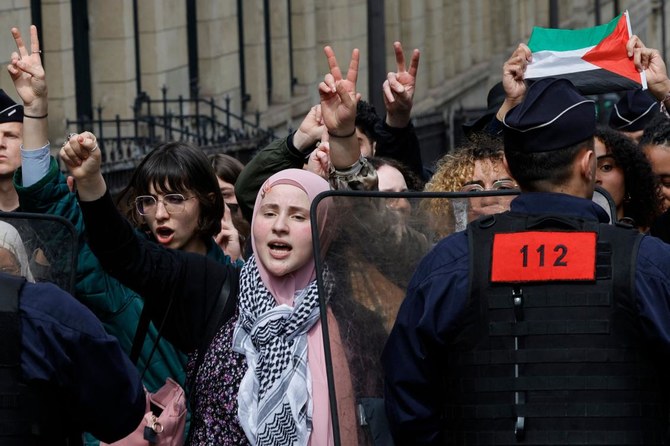
- About 50 protesters set up tents at midday Monday at the elite university’s courtyard
PARIS: French police removed dozens of students from the Sorbonne university after pro-Palestinian protesters occupied the main courtyard of the elite institution in Paris on Monday.
About 50 protesters set up tents at midday Monday at the Sorbonne university courtyard in support of Palestinians, echoing similar encampments and solidarity demonstrations across the United States.
Protesters unveiled a giant Palestinian flag and chanted slogans in support of Palestinians in Gaza, as Israel continues its offensive following the deadly Oct. 7 Hamas attack that triggered the Israeli-Hamas war. Police entered the university grounds in the early afternoon and removed them.
About 100 demonstrators took part in the protest near the prestigious university amid heavy police presence that were also guarding the university entrance to prevent students from setting up camp inside again.
Lorelia Frejo, a graduate student at the Sorbonne who joined a protest outside the university, said police used force to remove her peers from the courtyard. “They were peaceful and police took them out with no explanation,” Frejo said. Students in Paris were inspired by the protests at New York’s Columbia University who remain steadfast despite police pressure, she added.
“They (Columbia protesters) are very strong and want to fight for justice and for peace in Palestine,” Frejo said.
The Sorbonne occupies a unique place at the heart of French public and intellectual life. Last week, President Emmanuel Macron chose it as the venue to deliver a speech on his vision of Europe ahead of elections for the European Parliament in June.
Last week protests broke out at another elite university in the French capital region, the Paris Institute of Political Studies, known as Sciences Po, which counts Macron and Prime Minister Gabriel Attal among its many famous alumni.
Tensions had broken out on campus as pro-Palestinian students inspired by Gaza solidarity encampments at campuses in the United States sought to occupy an amphitheater.
On Friday, pro-Palestinian and pro-Israeli demonstrators faced each other in a tense standoff in the street outside the school. Riot police stepped in to separate the opposing groups.
The protest ended peacefully, when students agreed to evacuate the building late on Friday. The head of Sciences Po said an agreement with students had been reached.
Afghan Taliban’s treatment of women under scrutiny at UN rights meeting
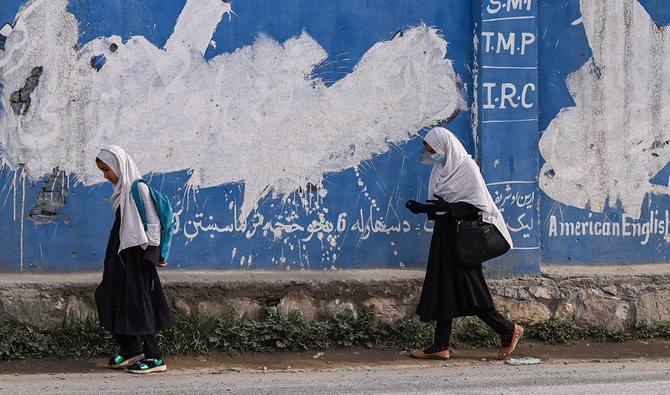
- The Taliban say they respect rights in line with their interpretation of Islamic law
- Taliban have barred girls from high school and women from universities and jobs
GENEVA: Afghanistan’s Taliban face criticism over their human rights record at a UN meeting on Monday, with Washington accusing them of systematically depriving women and girls of their human rights.
However, in an awkward first for the UN Human Rights Council, the concerned country’s current rulers will not be present because they are not recognized by the global body.
Afghanistan will instead be represented by an ambassador appointed by the previous US-backed government, which the Taliban ousted in 2021.
In a series of questions compiled in a UN document ahead of the review, the United States asked how authorities would hold perpetrators to account for abuses against civilians, “particularly women and girls who are being systematically deprived of their human rights“?
Britain and Belgium also raised questions about the Taliban’s treatment of women. In total, 76 countries have asked to take the floor at the meeting.
The Taliban say they respect rights in line with their interpretation of Islamic law.
Since they swept back into power, most girls have been barred from high school and women from universities. The Taliban have also stopped most Afghan female staff from working at aid agencies, closed beauty salons, barred women from parks and curtailed travel for women in the absence of a male guardian.
Under the US system, states’ human rights records are subject to peer review in public meetings of the Geneva-based Human Rights Council, resulting in a series of recommendations.
While non-binding, these can draw scrutiny of policies and add to pressure for reform.
The UN Human Rights Council, the only intergovernmental global body designed to protect human rights worldwide, can also mandate investigations whose evidence is sometimes used before national and international courts.



